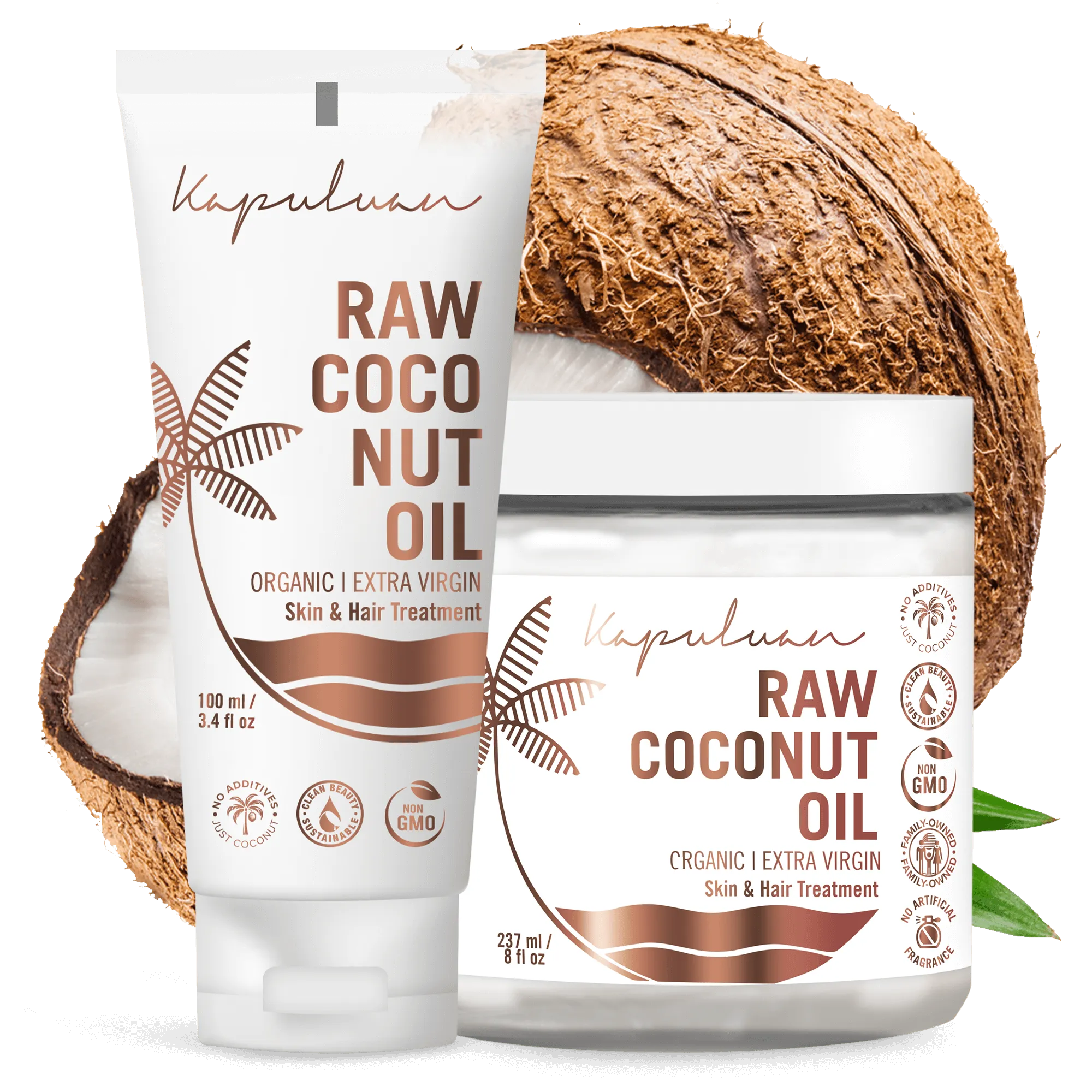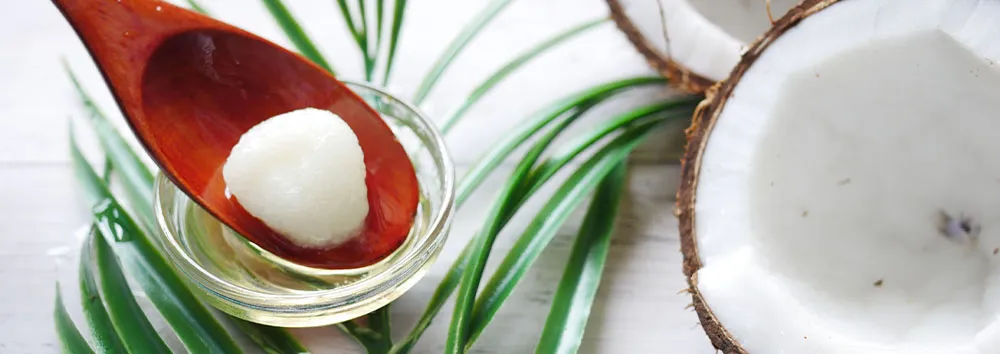
There are two criteria that greatly define one’s choice of oil for the everyday cooking process:
- The smoking point of the oil
- The amount of saturated fats it contains
High temperatures that are used in the process of cooking heat the oil to a certain point. If that point is higher than the smoking point of the particular oil, it starts generating toxic fumes and free radicals, which are extremely harmful for the body. Taking this into consideration, the choice of cooking oil should always fall on one that has a high smoking point. The smoke point of cold-pressed virgin coconut oil is about 350 degrees, therefore cooking with coconut oil is marked as safe and suitable.
Coconut oil is 100% fat, 86% of which is saturated. The high constitution of saturated fats helps to withstand high cooking temperatures. Apart from that, saturated fats are considered to be extremely harmful, as they supposedly raise bad cholesterol, which is a direct cause of cardiovascular diseases. But are the saturated fats in the coconut oil really that bad?
The Benefits of Consuming Coconut Oil
Coconut oil has a unique combination of fatty acids that are mainly associated with raised levels of good cholesterol (HDL) in the blood, while they also help the body absorb fat-soluble vitamins such as A, D, E and K. Half of those 86% saturated fatty acids consist of lauric acid. Lauric acid is a very rare saturated fat considered to be a medium-chain fatty acid that has shown a very beneficial effect on many health aspects.
Lauric acid is mostly known for its anti-inflammatory and antifungal benefits, therefore, it’s associated with reducing acne problems, viruses and fungal infections. Moreover, the metabolizing process of lauric acid results in direct absorption into the bloodstream, where it is utilized as an immediate fuel less likely to be stored in the body as fat, but used as energy. Furthermore, this also helps boost the body’s metabolism and aids in the weight-loss process.
Coconut oil is relatively new in the western diet. However, in certain places like in Southeast Asia where coconut trees thrive, coconut oil has been used since forever. These nations are associated with longevity and some of the lowest rates of heart disease. Nutrition-wise, coconut oil is a great addition to your daily diet. Flavor-wise, it is pretty neutral, however, when used in certain recipes, it can greatly improve the taste.
Choosing Your Product
When buying and using coconut oil, be mindful of its origin and sourcing. Refined or hydrogenated coconut oil involves significant processing and includes harmful chemicals. All of these additives transform the good in coconut oil to harmful substances. To enjoy all the benefits, reach for cold-pressed, unrefined, extra-virgin organic coconut oil.
Baking With Coconut Oil
Coconut oil is excellent for baking purposes. In baked goods, it can be used as a substitute for butter or other oils that are used for the recipe. Regardless of the fat used in the recipe, you can trade it with coconut oil in an equal amount. However, when baking with coconut oil, you should use room-temperature ingredients to prevent it from clumping. Coconut can also be used for greasing a baking pan.
Coconut oil is even great for oven roasting, thus you can use it for:
- – Coating meat or poultry in coconut oil and spices before baking
- – Roasted potatoes and other vegetables
- – Roasted nuts
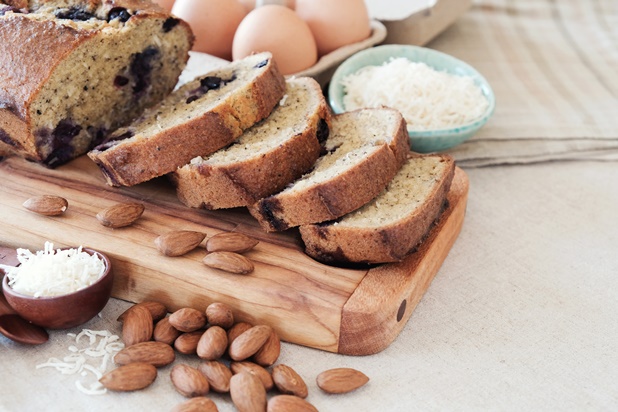
Using Coconut Oil for Frying
Coconut oil is a great choice for sautéing and stir-frying. For best results, it’s recommended to keep the burner at medium heat when cooking with coconut oil. Additionally, coconut oil is perfect for stir-frying vegetables, meat, eggs, or fish.
The more saturated fat a cooking oil has, the better it stands up to heat. High amounts of saturated fats make coconut oil perfect for pan-frying. Preheat the oil to 350℉ for the best crispy result. Although eating fried foods is not recommended more than two times a week, using coconut oil can make one of the healthiest options for achieving a crunchy, golden crust.
Coconut Oil in Raw Food
Probably one of the best ways to enjoy all the benefits of coconut oil is to use it in raw form. Without undergoing any heat processing, the oil delivers all the beneficial compounds to your body. The easiest way to implement it and enjoy improved taste is by mixing it into sauces and salad dressings. However, there are many great no-bake recipes that include coconut oil for better consistency and flavor, and of course to increase the nutritional value.
Here is one healthy, vegan-friendly, easy-to-make raw recipe for a sweet tooth.
Recipe – Coconut Oil Energy Balls
Ingredients:
- 1 cup dates
- 1/2 cup crushed walnuts
- 1/2 cup crushed almonds
- 1/4 cup cacao powder
- 1/4 cup coconut flakes
- 1 tbsp coconut oil
Blend, roll into balls, and enjoy. Don’t forget to add a spoonful of coconut oil to any raw recipe to enjoy all the pure benefits of the coconut oil.
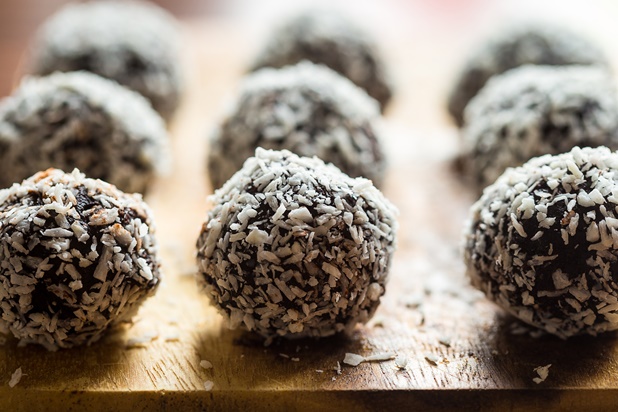
Coconut Oil in Your Morning Coffee
The practice of adding coconut oil in the morning coffee has become very popular recently, and for a reason. Not only does coconut oil improve the taste, but it also transforms this beloved beverage into a powerful potion.
Most of us rely on a good caffeine boost while enjoying a tasty cup of coffee as our favorite morning ritual. Apart from this, coffee doesn’t offer much nutritional value. And while clinging so much to this beloved routine, why not add a spoonful of coconut oil to your coffee, making it full of nutrients and benefits?
As mentioned before, coconut oil has just the right kind of fat that the brain and body both require. The medium-chain fatty acids are the essential building blocks the brain needs for proper brain function. Therefore, a spoonful of coconut oil in your coffee contributes to increased concentration, improved memory and focus throughout the day. But it gets even better.
The same medium-chain triglycerides are metabolized very slowly, resulting in an extended energy release, meaning you will enjoy a great energy boost that will last throughout the day. Consequently, the calorie content will be more readily used as an immediate source of energy, meaning it’s less likely to be stored as fat.
The effects? Optimal brain function and extended high-level of energy. You will feel more awake, and you will be able to push yourself harder on that morning or evening workout routine.
The recipe? Simple as it can be.
#1 Recipe
Coconut flavor lovers don’t mind the simple add-a-spoon-of-oil-to-the-coffee recipe. All you need for this recipe is your favorite coffee and a spoonful of coconut oil. If you use sweeteners, you are unlikely to notice any differences in taste, however, there will be a film of oil on the top, which some people don’t like. For those, here is another recipe to enjoy.
#2 Recipe
1. Brew your regular cup of coffee and pour it into a blender, along with a teaspoon of coconut oil.
2. Blend for about 30 seconds to 1 minute. You will notice the mixture becoming frothy.
3. Add any extras that you prefer like coconut milk, cinnamon, vanilla or sweetener.
4. Give it another quick blend and voila!
5. Pour the mixture in your favorite cup to enjoy exceptionally tasty coffee with loads of benefits.
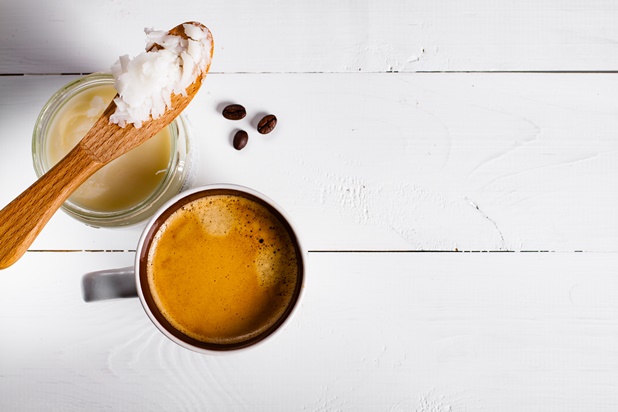
Coconut Oil in Smoothies
If you are a member of the minority of people that do not drink coffee in the morning, then chances are you are a step further with the healthy-eating routine. Instead, if you prefer to start your day off with a healthy bowl or a fruit smoothie, then you can choose to add a spoonful of coconut oil in it as a way to add good fat into your diet. Coconut oil can only enhance the taste and boost your daily performance.
Although you can add coconut oil to any recipe you prefer, without changing much of the taste or consistency, here are some recipe ideas for nutrition-dense and healthy smoothies.
#1 Recipe
Ingredients for your tropical smoothie:
- 1 cup mixed frozen mango and pineapple chunks
- 2 teaspoons of organic coconut oil
- 1 cup spinach leaves
- 2 tablespoons of chia seed
- 1 cup of coconut or cashew milk (as preferred)
Blend all for a minute and pour your wake-up icy and sweet treat with loads of richness in a tall glass.
#2 Recipe
Coconut raspberry smoothie ingredients:
- 2 bananas
- 1 cup of raspberries
- 1 tablespoon coconut oil
- 1 tablespoon flax seed
- 1 date pitted (optional if you like an extra sweet taste)
- ⅕ cup of water
Blend, pour, drink, enjoy, and recover!

Coconut Popcorn?
Popcorn has the potential to be one of the much-loved healthiest snacks. Sadly, all the potential is gone with the common practice of using harmful oils rich in saturated fats in the making, not to mention the high level of sodium, sugar or butter added.
Well, to enjoy a perfectly tasty and healthy snack, next time you are about to pop some popcorn, use coconut oil. If you haven’t tried this yet, here are some recipes that are healthier alternatives that you will love!

Recipe
Heat a tablespoon of organic coconut oil over medium-high heat. Once the oil begins to shimmer, add in a measuring cup of popcorn kernels suitable for the size of the pot. It’s usually ¼ to ½ cup popcorn kernels. Cover the pot and gently shake it to cover the popcorn with oil. Once the kernels are all popped, remove the pot from the heat. Pour the popcorn in a large bowl.
If you prefer to season your popcorn, you can use the following tips to enhance the taste and nutritional value:
- – Add toasted coconut flakes for an extra coconutty taste
- – Add a tablespoon of agave syrup, if you prefer sweet popcorn
- – Add seeds for an extra crunchy snack
- – If you prefer a basic popcorn style, add some sea salt and maybe a sprinkle of pepper
- – If you like your popcorn with butter, melted coconut oil is a great substitute. You’ll get the same flavor from a much safer and healthier source
It’s safe to say now – eat as much as you like!
Notice
Allergic reaction to coconuts is reported in an insignificant percentage of the population. However, as this type of reaction is the only possible side effect you might experience if you have never used coconut oil before, then it is suggested to test it on your skin prior to using. Apply a small amount on your elbow or any part of the skin that is not very sensitive and wait for 12 hours for any reaction. If there is no reaction like redness or itching, you are lucky to be enjoying all the benefits of coconut oil in your meals.

